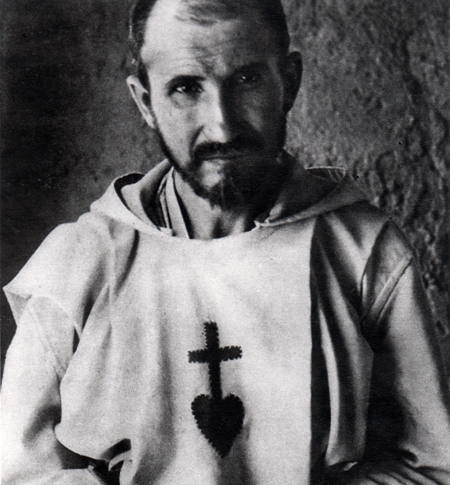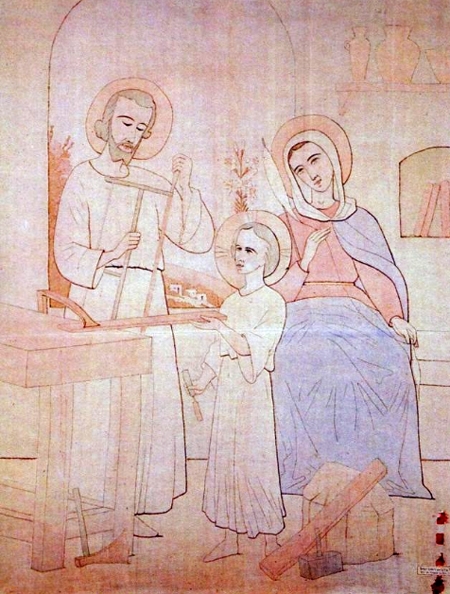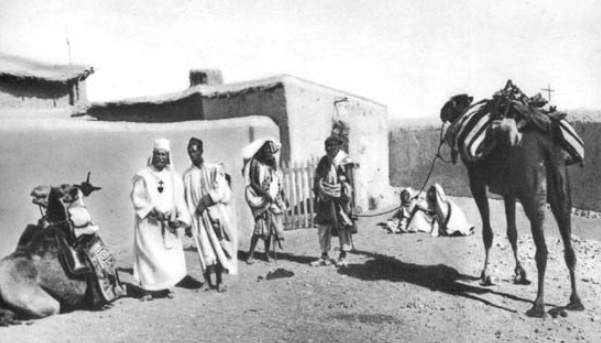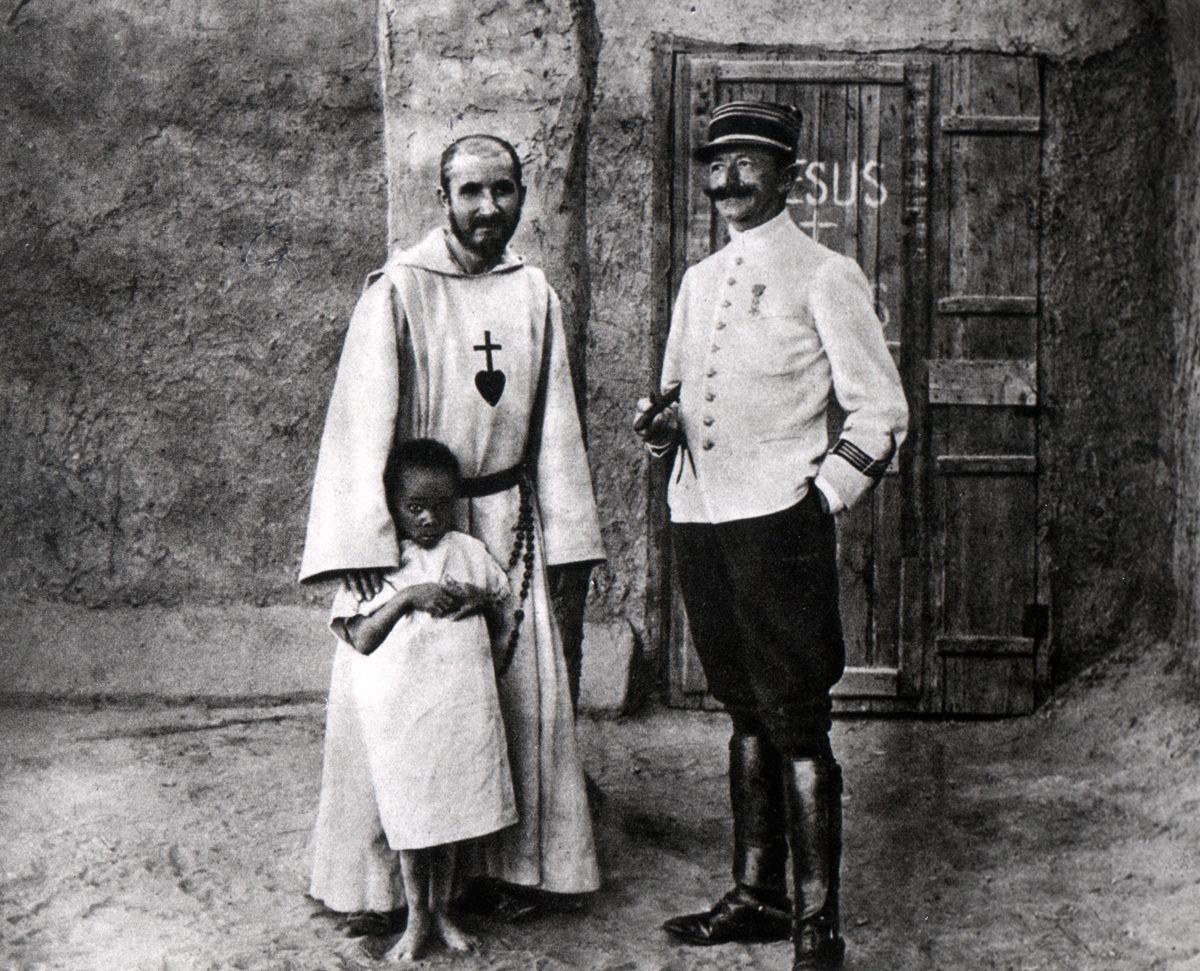Brother Charles
The life of this French priest who lived in the Sahara is an inspiration for our work. He is the source of our motto, “Cry the Gospel with your life.”

Charles de Foucauld was born in Strasbourg, France on September 15, 1858. He was orphaned as a child and raised by his maternal grandfather. The recipient of a large inheritance, Charles lived a worldly life that resulted in the gradual loss of his faith.
Charles served in the French Army and was stationed for a time in Algeria. This was the beginning of his fascination with North Africa. After serving in the army, he traveled throughout Morocco. A book he wrote on his explorations earned Charles a gold medal from the Geography Society of Paris.
His contact with devout Muslims in Morocco stirred Charles’ heart:
“Islam really shook me to the core. The sight of such faith, of these people living in the continual presence of God, made me glimpse something greater, truer than worldly concerns. I started studying Islam, and then the Bible.”
Back in Paris, Charles felt a growing need to renew his own religious commitments. In late October 1886, Charles spoke with Father Huvelin at St. Augustine’s Church. After confessing his sins and receiving holy communion, Charles experienced a new horizon opening in his life:
“As soon as I believed there was a God, I understood that I could not do anything other than live for Him. My religious vocation dates from the same moment as my faith. How great God is! There is such a difference between God and everything that is not Him!”
Fr. Huvelin encouraged Charles to make a pilgrimage to the Holy Land. His faith strengthened by the journey, Charles became inspired to imitate the “hidden life” of Jesus of Nazareth.
“Everybody knows that the first effect of love is imitation….I didn’t feel I was made for preaching like Jesus in his public life, so I needed to imitate him in his hidden life as a poor and humble workman at Nazareth.”

Searching for a way to live this life, Charles entered a Trappist monastery. Realizing that his vocation was leading him elsewhere, he lived for a while as a gardener and handyman for a convent of Poor Clare nuns in the Holy Land. The mother superior helped Charles discern a vocation to the priesthood.
Life in the Desert
In 1901, Charles was ordained a priest of the Diocese of Viviers in France. By then, his understanding of his vocation had developed: he did not need to live in the Holy Land to imitate the hidden life of Jesus.
“I think we can live the life of Nazareth anywhere, sink ourselves into hiddenness, live in obedience, and embrace the Cross.”
Charles decided to return to the Sahara and received permission to establish a hermitage in Beni-Abbès in Algeria. He later built a second hermitage far to the south in Tamanrasset, a tiny settlement in a remote region of volcanic mountains called the Hoggar.
“It is necessary to enter the desert and remain there a while in order to receive the grace of God. It is in the desert that we empty ourselves, that we chase away all that is not God, that we completely empty out the little house of our souls so that God alone may fill it. . . . It is indispensable. . . . It is a time of grace.”
Out in the desert, Charles led an austere life, marked by prayer and an unassuming ministry of friendship to the nomadic tribes of Muslims known as the Tuaregs. To them, he became known as a “Marabout,” a holy man.
“I want to accustom all the inhabitants, Christians, Muslims, Jews, and nonbelievers, to look upon me as their brother, the universal brother. Already they’re calling this house ‘the fraternity’ — about which I’m delighted — and realizing that the poor have a brother here — not only the poor, though; all men.”

Charles welcomed all who came to his outpost: the indigenous people, French soldiers, and anyone else traveling across the formidable landscape of the deep Sahara. He offered whatever charitable assistance his means allowed. His motivation was simply to imitate the generous love of Jesus.
“Our entire existence and being should shout the Gospel from the rooftops. Our entire person should breathe Jesus. All our actions and our entire life should proclaim that we belong to Jesus.”
Charles also voiced his protest against slavery and other acts of injustice inflicted upon the poor of the desert.

He hoped to start a new religious community based on the life of Nazareth. Charles wrote a rule for the “Little Brothers of the Sacred Heart of Jesus,” and designed a “Heart and Cross” insignia to be worn on the front of a religious habit.
“The emblem of Jesus’ Heart reminds you that you must give God the same love He gives you . . . and that you must love your neighbor as yourself . . . because God loves him as He loves you.”
No followers joined Charles during his lifetime. His life would have a much greater impact in years to come, inspiring religious orders and secular fraternities around the world.
On December 1, 1916, Charles was shot and killed by a young member of a rebel Tuareg tribe. In a notebook he carried with him, Charles had written: “Live as though you were going to have to die as a martyr today.”
Pope Paul VI wrote, “The modern world is not convinced by teachers. It only believes witnesses.” In a world marked by division and despair, where deserts grow both physically and spiritually, Charles is a credible witness to the life-giving message of the Gospel. He invites everyone to be the same:
“Carry the Gospel with you, not by preaching it with your mouths, but by preaching it through your examples, not by proclaiming it, but by living it.”
Related blog posts on our website:
The Canonization of Charles de Foucauld – Sr. Virginia attended the canonization ceremony in Rome and also made a pilgrimage to Assisi. Here is her account of her trip along with some photos.
A Good Book about a New Saint – A review of Hidden in God by Bonnie Thurston, an excellent book about Charles and his spirituality.
The Confession of Br. Charles – Charles outlined his struggles and faults in a letter he wrote to his spiritual director. Maybe you can identify with some of them. If you want to have more in common with a saint, then don’t give up!
Like Jesus at Nazareth – 14 resolutions Charles wrote that reveal his understanding of the life of Nazareth.
Here You Have Watches, There We Have Time – A fascinating interview with a modern-day Tuareg living in France.
